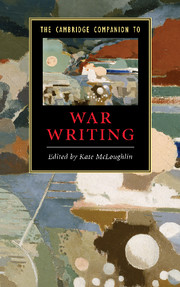2 - War and words
from Part I - Themes
Published online by Cambridge University Press: 28 January 2010
Summary
War literature constantly advertises its own inadequacy. “How can I picture it all? It would take a god to tell the tale,” despairs Homer in the Iliad - and this in what is perhaps the greatest of all representations of war. Homer's disclaimer is an example of the classical rhetorical trope adynaton (in Latin, impossibilia), which can be defined as the expression of “the impossibility of addressing oneself adequately to the topic.” It is easy to suggest why this topos proliferates in war writing - but is it anything other than an expression of (false) modesty? This chapter considers why it is difficult to find words to convey war; why, nevertheless, words must be found, and what happens when war and words are brought together.
Why is it difficult to find words for war?
War is a massive and complex phenomenon. The Second World War lasted six years, ranged over the globe, and killed some fifty million people. War reconfigures nations, displaces populations, devastates land. Difficulties in finding words for all this arise immediately. Here is Shakespeare on the particular problems faced by the theater:
[P]ardon, gentles all,
The flat unraised spirits that hath dared
On this unworthy scaffold to bring forth
So great an object. Can this cockpit hold
The vasty fields of France? Or may we cram
Within this wooden O the very casques
That did affright the air at Agincourt?
- Type
- Chapter
- Information
- The Cambridge Companion to War Writing , pp. 15 - 24Publisher: Cambridge University PressPrint publication year: 2009
- 12
- Cited by

